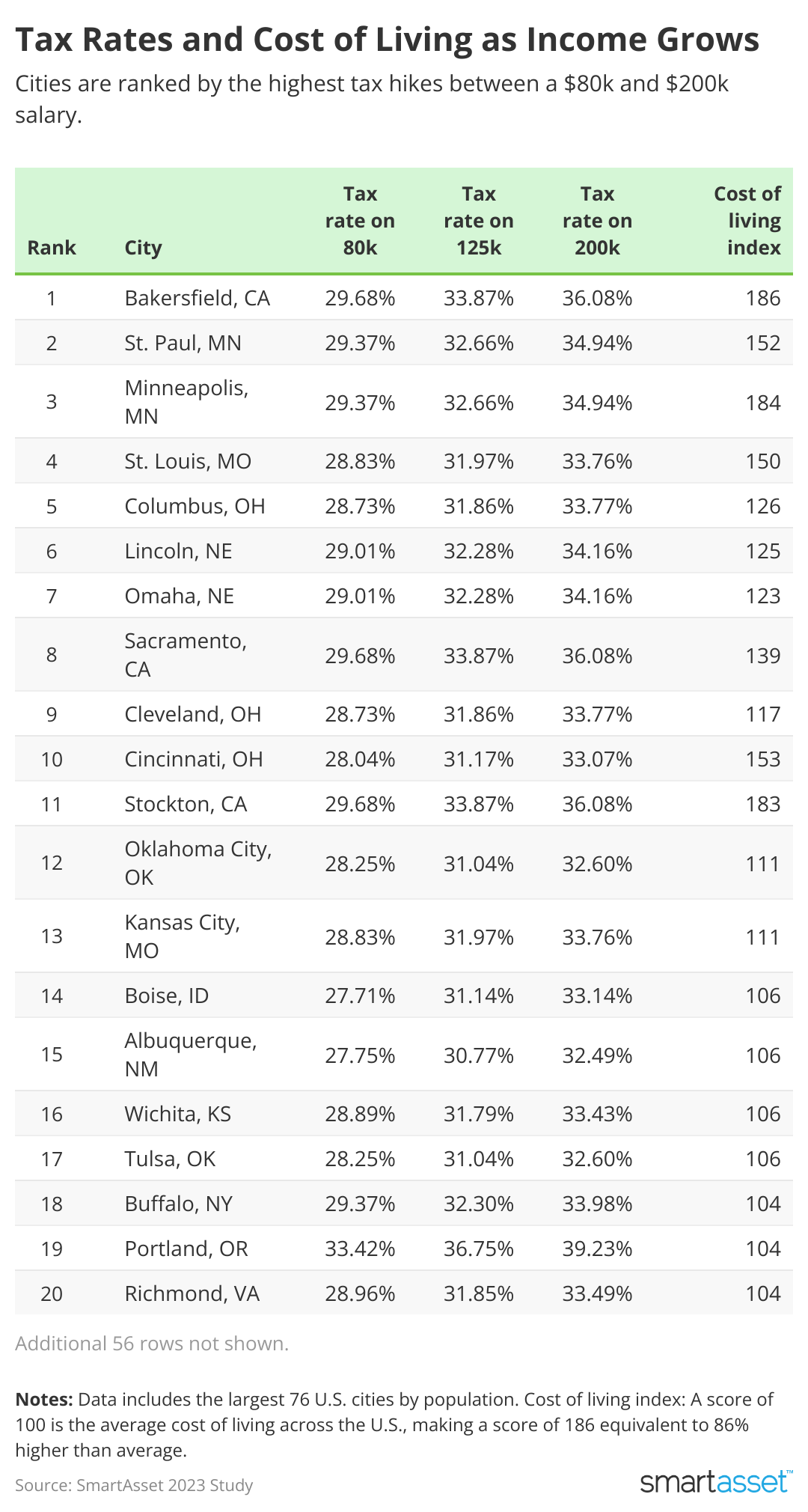
Climbing the income ladder: How taxes impact different salaries
Climbing the income ladder: How taxes impact different salaries
Remote work has allowed skilled workers to mobilize and capitalize on the benefits of different areas of the U.S. After all, a $100,000 salary is worth far more in a place like Memphis than high-cost cities like New York and San Francisco. But as workers progress in their careers and climb the income ladder, higher tax rates often erode larger proportions of their income.
With this in mind, SmartAsset set out to calculate the purchasing power of different salaries to see what it's like to climb the income ladder in cities across the country. The study compared the after-tax income for three income levels – $80,000, $125,000 and $200,000 – in 76 of the largest U.S. cities and then adjusted those figures for the cost of living in each place.
Key Findings
- A $200,000 salary can lose as much as 66% of its value to taxes and cost of living. Meanwhile, an $80,000 salary may only lose as little as 12% to the combination of taxes and cost of living. Taxes alone can be as low as 24% on a $80,000 salary and as high as 39.5% on a $200,000 salary. Being in a low cost of living area can help alleviate the tax burden, however.
- Texas is ideal for workers climbing the income ladder. As one of nine states that doesn't levy an income tax, Texas is especially friendly to workers at all multiple income levels. The Lone Star State is home to seven of the 10 cities where $80,000, $125,000 and $200,000 salaries all go the furthest after accounting for taxes and the cost of living.
- Memphis, TN has the lowest tax rates across the board. The effective federal, state and local tax rate for Memphis residents making $80,000 is roughly 12%. This rises to 15% for those making $125,000, and 16.6% for $200,000. El Paso, TX and Oklahoma, OK place second and third, respectively, for tax rates at each income level.
- High-cost cities like New York have this advantage. Those climbing the career ladder in expensive cities like NYC, San Francisco, Seattle, Miami and Washington, D.C. receive more equitable tax treatment than other places. For example, a person making $200,000 in New York loses just 2.7% more of their income to taxes and the cost of living than a person making $80,000. In St. Paul, Minnesota, where the cost of living is considerably lower, a person earning $200,000 loses 5.8% more of their adjusted income when compared to someone who makes $80,000 per year.
- People making $80,000 pay the most in taxes in these cities. No city has a higher tax rate (34.8%) for workers earning $80,000 than Baltimore. Charm City is followed by Portland, OR (33.4%), New York, NY (32.6%), Louisville, KY (32.2%) and Lexington, KY (31.6%). For a $200,000 salary, the top 5 look similar – only San Francisco takes the fourth spot, while Louisville gets bumped to fifth.

Where Taxes Affect Salary Increases the Most
- Bakersfield, CA
In Bakersfield, an $80,000 salary is worth $52,528 after accounting for taxes and the local cost of living, which is 7.1% higher than the national average. A $200,000 income, meanwhile, is worth $119,365 on an adjusted basis. As a result, a person who makes $200,000 loses around 6% more of their income to taxes and the cost of living compared to a person earning $80,000 per year. In other words, taxes and the cost of living have a bigger impact on workers climbing the income ladder in Bakersfield than anywhere else.
- St. Paul, MN
An $80,000 salary in St. Paul has the purchasing power of $59,418 once taxes and the local cost of living are factored in. A $200,000 income, on the other hand, feels more like $136,830. That means taxes and the cost of living eat up 5.8% more for a high earner than a person making $80,000 – second most across the study.
- Minneapolis, MN
A worker climbing the income ladder in Minneapolis will see their tax rate jump from 29.3% at $80,000 per year to 34.9% at $200,000. After accounting for taxes and the cost of living, an $80,000 income in Minneapolis has the purchasing power of $58,435 while $200,000 is worth $134,565. As a result, a person making $200,000 sees taxes and the cost of living eat up 5.7% more of their income than someone making $80,000.
- St. Louis, MO
St. Louis has the third-lowest cost of living across the study, so a person making $80,000 per year still has $65,447 in purchasing power after taxes. But by the time they reach the $200,000 income plateau, taxes and the cost of living reduce their purchasing power 5.67% more when compared with an $80,000 income.
- Columbus, OH
Thanks to relatively low tax rates and a cost of living that's 10.7% lower than the national average, an $80,000 income is worth $63,846 in Columbus. Meanwhile, a $200,000 salary in Ohio's largest city has the purchasing power of $148,326. That means taxes and the cost of living erode a $200,000 income by 5.64% more when compared with an $80,000 income.
- Lincoln, NE
In Lincoln, taxes and the local cost of living reduce the purchasing power of an $80,000 salary by just 22.6%. That number jumps to 28.2% for a $200,000 income, which is worth $143,438 after accounting for taxes and the cost of living. As a result, a worker in Lincoln loses out on 5.61% more of their salary when they hit the $200,000 mark when compared with an $80,000 salary.
- Omaha, NE
In Omaha, an $80,000 salary is worth $61,463 after factoring in taxes and the local cost of living, which is 7.6% less than the national average. A $200,000 income, meanwhile, has the purchasing power of $142,506. As a result, a person who makes $200,000 loses 5.5% more income to taxes and the cost of living than someone who earns $80,000 per year.
- Sacramento, CA
The cost of living in the California state capital is 18% higher than the national average. As a result, an $80,000 income is only worth $47,676 after taxes and a $200,000 income is worth $108,339. A person making $80,000 in Sacramento would see 40.4% of their income eaten up by taxes and the cost of living. However, that number jumps 5.4% to 45.8% once they reach the $200,000 plateau.
- Cleveland, OH
In Cleveland, taxes and the local cost of living reduce the purchasing power of an $80,000 salary by just 24.1%. That number rises to 29.4% for a $200,000 income, which is worth $141,060 after accounting for taxes and the cost of living. By the time workers climb the income ladder in Cleveland to $200,000, they'll lose out on an additional 5.3% of their income when compared with an $80,000 salary.
- Cincinnati, OH
In Cincinnati, an $80,000 salary is worth $60,345 after adjusting for taxes and the local cost of living, which is 4.6% lower than the national average. A $200,000 income, on the other hand, is worth $140,304. As a result, a person who makes $200,000 loses around 5.2% more of their income to taxes and the cost of living when compared with someone who earns $80,000 per year.
Where Taxes Increase the Least
These are the cities with the lowest tax discrepancies between a $200,000 and $80,000 salary.
- Honolulu, HI: 2.6%
- Seattle, WA: 2.6%
- New York, NY: 2.7%
- Boston, MA: 2.8%
- Anchorage, AK: 3.0%
- Plano, TX: 3.2%
- Miami, FL: 3.2%
- Arlington, VA: 3.3%
- Chicago, IL: 3.4%
- Washington, DC: 3.5%
Data and Methodology
SmartAsset used its paycheck calculator to determine tax rates at $80,000, $125,000 and $200,000 for a single tax-filer for each of the 76 largest U.S. cities. The study adjusted the post-tax salary level for the local cost of living premiums as determined by the Council for Community and Economic Research's data for Q3 2022.
This story was produced by SmartAsset and reviewed and distributed by Stacker Media.



